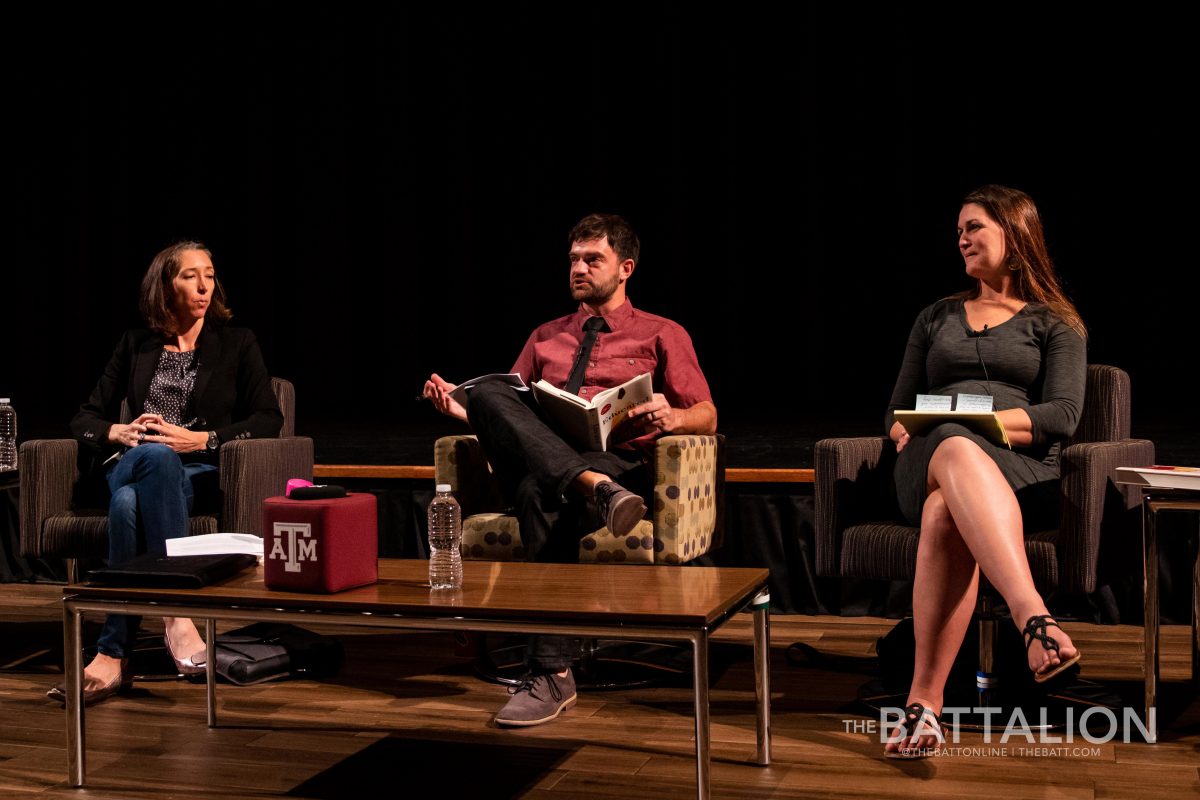Texas A&M Liberal Arts professors took to the Rudder Theatre stage on Monday to discuss the New York Times Best Selling autobiography “Educated.”
The book tells the story of Tara Westover, a girl raised in small-town Idaho by devout Mormon parents who do not believe in formal education or doctors and are constantly preparing for the end of the world. After her older brother leaves home to pursue higher education at Brigham Young University, young Tara decides that she wants to do the same. Her journey to higher education, however, is not without trials. Obstacles in her path come in the form of abusive family members, inner religious turmoil and deciding between family loyalty and freedom.
The featured panelists, Claire Katz, Theresa Morris, Robin Veldman, Matthew Vess and Anna Wolfe, gave their perspectives on the book and its significance to certain humanities disciplines.
Specializing in areas such as anthropology and psychology, each panelist gave their comments on “Educated” in relation to their respective area of expertise. Each chose passages they found important or insightful, then allowed attendees to present questions and comments.
Katz, associate dean of faculties, chose a passage that focused on Westover’s gradual dissociation from her family and how this contributed to her path of education. She said Westover’s choice to further her education was done not only without help from adult mentors but with the disapproval of her devout Mormon family.
“The tragedy of ‘Educated’ was not the child’s desire to pursue the education,” Katz said. “The tragedy of Westover’s ‘Educated’ was the inability of the parents and community to meet their children the rest of the way.”
Wolfe, an assistant communications professor, focused on a note from the author that comes after the story ends. In this note, Westover admits that her narration is unreliable at times.
Specifically, Westover said that she was never certain if her father, a man who hated doctors, called an ambulance when her brother caught on fire. Westover admits that every family member who was there has a different opinion on what really happened that day. This, Wolfe said, proves her belief that stories can never be communicated perfectly — a specific area of importance in the field of communications.
“Communication is necessarily imperfect,” Wolfe said. “Even if I obsess over the exact phrasing or tried to tell the truthful story. … [I] can’t guarantee you will fill those words with the same meanings that I do.”
Wolfe said no matter how hard a person tries to get a specific meaning across in their storytelling, there is no certainty that everyone will comprehend it the same, as each person’s understanding of life is affected by their worldview.
“Language is so deeply informed by the stories of our lives — our experiences, our worldviews, our beliefs, our assumptions, our values, our affiliations, our sense of belonging,” Wolfe said. “What is really amazing is that we ever understand a person outside of themselves at all. And yet, we do.”
According to Veldman, an assistant professor of religious studies, Westover’s worldview is deeply affected by her faith. The passage that Veldamn focused on describes Westover’s feelings of culture shock when she first arrived as a student at Brigham Young University.
“At various points [Westover] is reminded of her otherness by the clothing of the women around her,” Veldman said. “I see this passage as a powerful symbol of what we can gain from looking at religion from a more materially focused perspective.”
Veldman said “Educated” cultivated interesting questions from a religious studies perspective. When Westover sees her Mormon peers wearing skirts above their knee at BYU, she is in disbelief. This, according to Veldman, provided the opportunity for the authority of religion in one’s life to be analyzed.
“How do claims of religious authority affect power relations? How do they affect gender relations?” Veldman said. “How do religious teachings on how we should treat the natural world [differ] from how people actually do treat the natural world? Why is there often such a difference?”
International studies freshman Linsy Mariano attended this panel as a part of the Liberal Arts Common Ground program. As a first-generation student, Mariano said that the panelists perspectives on Westover’s life emphasized the relatability of the story.
“[Westover’s] story relates to being a first generation student and learning the process of college,” Mariano said. “When you come into college and into a big university as a first-generation student, [everyone] seems to know what they are doing.”
According to Wolfe, the perspective from which a person reads a story makes their experience unique and different for everyone else reading it. And it’s impossible for any one story to paint a complete picture of reality.
“We are all more complicated than the roles we are assigned in stories,” Wolfe said. “Stories are selective. They are partial, situated and unavoidably incomplete. And yet, they are consequential because the stories that we believe and the stories that we tell create the world as we know it.”
Vess, an associate professor of psychology, said Westover’s unique confidence and sense of self allowed her to follow the path of education that she did. As a teenager, Westover had a growth experience that changed her life as she knew it and was able to understand life differently because of that.
“As we get older we have fewer of those experiences,” Vess said. “But education is one of the ways you can have those experiences if you are open to them.”
Aggie Liberal Arts professors examine “Educated” through the lenses of their disciplines
October 14, 2019
Photo by Photo by Angelina Alcantar
Texas A&M professors Robin Veldman, Matthew Vess, Anna Wolfe participate in a discussion on The New York Times Best Selling autobiography “Educated.”
Donate to The Battalion
Your donation will support the student journalists of Texas A&M University - College Station. Your contribution will allow us to purchase equipment and cover our annual website hosting costs.




















